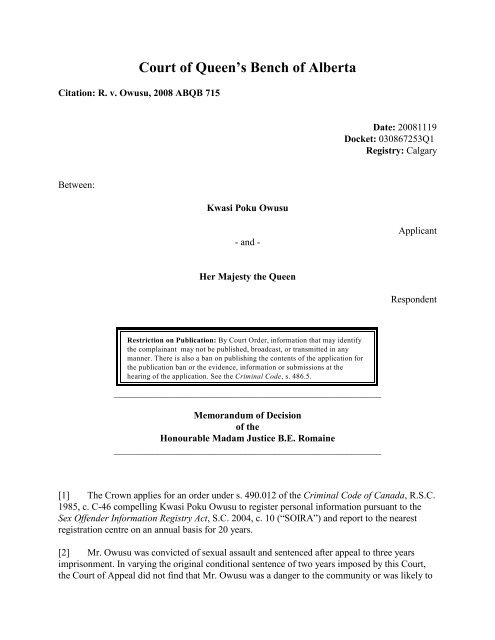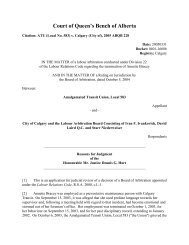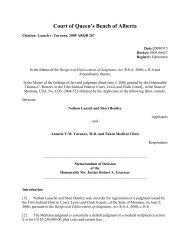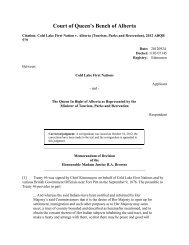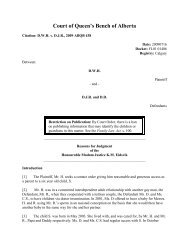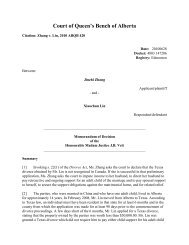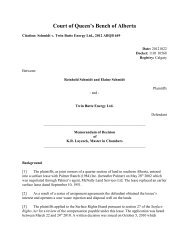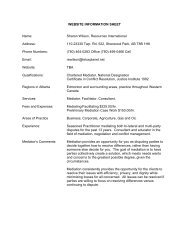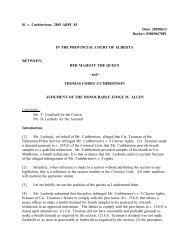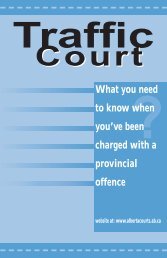Court of Queen's Bench of Alberta - Alberta Courts
Court of Queen's Bench of Alberta - Alberta Courts
Court of Queen's Bench of Alberta - Alberta Courts
Create successful ePaper yourself
Turn your PDF publications into a flip-book with our unique Google optimized e-Paper software.
<strong>Court</strong> <strong>of</strong> Queen’s <strong>Bench</strong> <strong>of</strong> <strong>Alberta</strong><br />
Citation: R. v. Owusu, 2008 ABQB 715<br />
Between:<br />
Kwasi Poku Owusu<br />
- and -<br />
Her Majesty the Queen<br />
Restriction on Publication: By <strong>Court</strong> Order, information that may identify<br />
the complainant may not be published, broadcast, or transmitted in any<br />
manner. There is also a ban on publishing the contents <strong>of</strong> the application for<br />
the publication ban or the evidence, information or submissions at the<br />
hearing <strong>of</strong> the application. See the Criminal Code, s. 486.5.<br />
_______________________________________________________<br />
Memorandum <strong>of</strong> Decision<br />
<strong>of</strong> the<br />
Honourable Madam Justice B.E. Romaine<br />
_______________________________________________________<br />
Date: 20081119<br />
Docket: 030867253Q1<br />
Registry: Calgary<br />
Applicant<br />
Respondent<br />
[1] The Crown applies for an order under s. 490.012 <strong>of</strong> the Criminal Code <strong>of</strong> Canada, R.S.C.<br />
1985, c. C-46 compelling Kwasi Poku Owusu to register personal information pursuant to the<br />
Sex Offender Information Registry Act, S.C. 2004, c. 10 (“SOIRA”) and report to the nearest<br />
registration centre on an annual basis for 20 years.<br />
[2] Mr. Owusu was convicted <strong>of</strong> sexual assault and sentenced after appeal to three years<br />
imprisonment. In varying the original conditional sentence <strong>of</strong> two years imposed by this <strong>Court</strong>,<br />
the <strong>Court</strong> <strong>of</strong> Appeal did not find that Mr. Owusu was a danger to the community or was likely to
Page: 2<br />
re<strong>of</strong>fend, but that, citing R. v. Sandercock (1985), 22 C.C.C. (3d) 79, “major sexual assaults<br />
without gratuitous violence by an <strong>of</strong>fender without a criminal record will attract a starting point<br />
sentence <strong>of</strong> three years”: R. v. Owusu, 2006 ABCA 239 at para. 7. The original sentencing<br />
proceeded the decision <strong>of</strong> the <strong>Court</strong> <strong>of</strong> Appeal in R. v. Redhead, [2006] A.J. No. 273; ABCA 84;<br />
th<br />
[2006] 6 W.W.R. 19; 56 Alta. L.R. (4 ) 15; 384 A.R. 206; 386 A.R. 206; 206 C.C.C. (3d) 315;<br />
69 W.C.B. (2d) 338; 2006 CarswellAlta 294 which clarified the law with respect to established<br />
sentencing practice relating to SOIRA orders, and thus the issue <strong>of</strong> whether a SOIRA order<br />
should be made was referred back to this <strong>Court</strong>.<br />
[3] The <strong>of</strong>fence <strong>of</strong> sexual assault is a designated <strong>of</strong>fence within the meaning <strong>of</strong> s. 409.011 <strong>of</strong><br />
the Criminal Code and therefore a SOIRA order is mandatory unless Mr. Owusu can establish<br />
pursuant to the exception set out in s. 490.012(4) that the impact <strong>of</strong> such an order on his privacy<br />
and liberty would be grossly disproportionate to the public interest in protecting society through<br />
the effective investigation <strong>of</strong> crimes <strong>of</strong> a sexual nature.<br />
[4] In R. v. Redhead at para. 20, the <strong>Court</strong> <strong>of</strong> Appeal noted that the test set out in s.<br />
490.012(4) required the sentencing court to assess the impact <strong>of</strong> a SOIRA order on the <strong>of</strong>fender,<br />
including the impact on his privacy, in determining whether the impact is grossly<br />
disproportionate to the public interest.<br />
[5] The <strong>Court</strong> suggested at para. 31 that any relevant type <strong>of</strong> impact can be considered,<br />
including impact on privacy and security interests, personal handicaps, the stigma <strong>of</strong> registration,<br />
the importance <strong>of</strong> rehabilitation and reintegration into the community and the possibly <strong>of</strong> police<br />
harassment. As noted in R. v. G.E.W., 2006 ABQB 317 at para. 23, “(w)hile economic impact<br />
was not specifically mentioned by the <strong>Court</strong>, it would appear to be relevant.” The <strong>Court</strong> <strong>of</strong><br />
Appeal commented in Redhead however that factors such as the lack <strong>of</strong> prior record <strong>of</strong> sexual<br />
assault, the influence <strong>of</strong> alcohol on the <strong>of</strong>fender or the circumstances <strong>of</strong> the <strong>of</strong>fence are not<br />
relevant to the question <strong>of</strong> the impact <strong>of</strong> the registration and reporting requirements on the<br />
<strong>of</strong>fender.<br />
[6] Mr. Owusu bears the evidentiary burden <strong>of</strong> establishing the impact <strong>of</strong> an order: Redhead<br />
at para. 26. The focus <strong>of</strong> the inquiry is on Mr. Owusu’s “present and possible future<br />
circumstances”: Redhead at para. 28.<br />
[7] There is no presumption <strong>of</strong> impact arising from the length <strong>of</strong> reporting obligations alone:<br />
Redhead at para. 33. The inquiry is not on whether there is a public interest in having the<br />
<strong>of</strong>fender registered, but on whether the impact on the <strong>of</strong>fender is “grossly disproportionate”: para.<br />
42. “Grossly” in this context means “a marked and serious imbalance”: para. 43.<br />
[8] As noted in G.E.W., the SOIRA was enacted to help police investigate sexual crimes. It<br />
requires an <strong>of</strong>fender to register his name, address, place <strong>of</strong> employment or education, telephone<br />
number, and physical description within 15 days <strong>of</strong> when he first becomes subject to its
Page: 3<br />
provisions. It then requires the <strong>of</strong>fender to report within 15 days <strong>of</strong> any change <strong>of</strong> residence or<br />
name, and between 11 months and 12 months after he last reported.<br />
[9] The Act also provides for notification <strong>of</strong> temporary absences from the <strong>of</strong>fender’s<br />
residence where they exceed 15 days:<br />
6.(1) A sex <strong>of</strong>fender shall notify a person who collects information at the registration<br />
centre that serves the area in which their main residence is located<br />
(a) <strong>of</strong> every address or location at which they stay or intend to stay, and <strong>of</strong><br />
their actual or estimated dates <strong>of</strong> departure from, and return to, their main<br />
residence or a secondary residence, not later than 15 days after departure<br />
if they are in Canada but are absent from their main residence and every<br />
secondary residence for a period <strong>of</strong> at least 15 consecutive days;<br />
(b) <strong>of</strong> their actual or estimated date <strong>of</strong> departure from their main residence or a<br />
secondary residence, not later than 15 days after departure if they are<br />
outside Canada for a period <strong>of</strong> at least 15 consecutive days; and<br />
(c) <strong>of</strong> their actual return to their main residence or a secondary residence after<br />
a departure referred to in paragraph (a) or (b), not later than 15 days after<br />
they return, unless they are required to report under section 4.1 or 4.3<br />
within that period.<br />
As noted in G.E.W. at paragraph 21, the <strong>Court</strong> has no ability to ameliorate any disproportionate<br />
impact <strong>of</strong> registration by varying the reporting conditions in any way.<br />
[10] Mr. Owusu gave evidence as to the potential impact <strong>of</strong> a SOIRA order on his privacy and<br />
liberty. He had just turned eighteen at the time <strong>of</strong> the <strong>of</strong>fence. As set out in both my reasons for<br />
sentence and the reasons on appeal, Mr. Owusu’s background prior to the <strong>of</strong>fence was<br />
impressive. He has a close and supporting relationship with his family and had been working<br />
part-time since junior high school and supporting his mother financially. He was attending SAIT<br />
attempting to obtain a diploma in chemical engineering with the goal <strong>of</strong> eventually transferring to<br />
university. He had been supported through the sentencing process by his teachers and a coach,<br />
who spoke strongly <strong>of</strong> his qualities as a leader in sports, a role model to young people and <strong>of</strong> his<br />
high potential. The pre-sentence report was the most positive one I have ever reviewed and was<br />
described by the appeal panel as being “extremely positive”.<br />
[11] When Mr. Owusu was originally sentenced to a conditional sentence, he began a program<br />
<strong>of</strong> out-patient counselling that was interrupted by the sentencing appeal. When incarcerated, he<br />
took advantage <strong>of</strong> a penitentiary program designed as for the “moderate sexual <strong>of</strong>fender” and<br />
postponed applying for parole a number <strong>of</strong> times in order to do so. He also took advantage <strong>of</strong><br />
classes in computing and English as a second language, later volunteering in that program. Mr.
Page: 4<br />
Owusu still intends to continue at SAIT when released and still hopes to attend university. After<br />
his release, he must complete one additional semester at SAIT to achieve a diploma in Chemical<br />
Engineering technology and then another two years <strong>of</strong> school for his diploma in chemical<br />
engineering. The earliest he could complete his schooling would be the spring <strong>of</strong> 2011. Mr.<br />
Owusu testified that he may have to interrupt the completion <strong>of</strong> his schooling periodically in<br />
order to work. Given his financial circumstances, he hopes to obtain work in the oilfield to fund<br />
his educational aspirations. He also hopes that he may be able to obtain a position where an<br />
employer may help him financially with school in return for a commitment on future work.<br />
[12] One <strong>of</strong> Mr. Owusu’s major concerns about the reporting requirements <strong>of</strong> a SOIRA order<br />
is that oilfield work requires flexibility in terms <strong>of</strong> travelling and considerable time away from<br />
the major urban areas <strong>of</strong> <strong>Alberta</strong>, and that the reporting requirements would be difficult and even<br />
impossible in some situations to observe . He also has concerns with respect to his employability<br />
as a chemical engineering technologist and a chemical engineer if his flexibility with respect to<br />
travel is impacted by the reporting requirements and the stigma arising from the requirements.<br />
Mr. Owusu gave evidence <strong>of</strong> the travel requirements <strong>of</strong> this kind <strong>of</strong> employment gleaned from<br />
his instructors at SAIT and his own experience. His testimony in that regard was not challenged,<br />
including the requirements <strong>of</strong> flexibility in timing and location and uncertainties in duration <strong>of</strong><br />
travel.<br />
[13] Counsel for Mr. Owusu concedes that R. v. Redhead makes it clear that the requirement<br />
<strong>of</strong> showing a marked and serious imbalance between the impact <strong>of</strong> a SOIRA order on an <strong>of</strong>fender<br />
and the public interest imposes a high threshold on an applicant, but submits that the threshold<br />
should not be so high that no applicant can satisfy it. If the legislation allows exemptions, he<br />
submits, some applicants have to be able to satisfy the test. This was effectively recognized in<br />
Redhead at para. 44 where the <strong>Court</strong> noted that if the exception was so narrow that a SOIRA<br />
order was effectively mandatory, the exception became meaningless.<br />
[14] Counsel for Mr. Owusu also submits that it is clear both from his testimony and the<br />
sentencing proceedings that Mr. Owusu has a low risk <strong>of</strong> re-<strong>of</strong>fending and that he has shown a<br />
willingness to undergo treatment. It appears that the <strong>Court</strong> <strong>of</strong> Appeal in Redhead at para. 42 has<br />
rejected any emphasis on whether there exists a public interest in registering an <strong>of</strong>fender on a<br />
case-by-case basis, instructing the sentencing court to focus instead on the issue <strong>of</strong> the impact <strong>of</strong><br />
the order on the <strong>of</strong>fender. However, Slatter, J. (as he was) suggests in G.E.W. at para. 23 that in<br />
the process <strong>of</strong> balancing personal impact with public interest in order to determine whether there<br />
would be a disproportionate effect, the <strong>Court</strong> can consider the risk that an <strong>of</strong>fender would re<strong>of</strong>fend,<br />
the nature <strong>of</strong> the crime likely to be committed if there is another <strong>of</strong>fence and the effect<br />
that exemption might have on the ability to investigate crime. In this case, I am satisfied by the<br />
evidence that Mr. Owusu would be at low risk to re-<strong>of</strong>fend and note that he and the victim <strong>of</strong> his<br />
<strong>of</strong>fence were close in age and that there is no suggestion that Mr. Owusu is a paedophile.<br />
[15] In summary, Mr. Owusu has presented the following evidence <strong>of</strong> disproportionate impact:
Page: 5<br />
a) that he has an achievable dream <strong>of</strong> following a career path that requires flexibility<br />
and frequency <strong>of</strong> travel and a SOIRA order would thus impose onerous reporting<br />
requirements; and<br />
b) that the reporting requirement may affect his employability, particularly given that<br />
he is at the beginning <strong>of</strong> his career path and faces unique challenges, given his<br />
position in Canadian society as a first generation immigrant with poor language<br />
skills, thus affecting his ability to reintegrate into society and to fully rehabilitate.<br />
[16] While it is certainly true that many positions require some degree <strong>of</strong> travel and many new<br />
Canadians face similar challenges in integration, the combination <strong>of</strong> these factors with Mr.<br />
Owusu’s relative youth and his realistic efforts to achieve a long-held educational goal persuade<br />
me that, in the unique circumstances <strong>of</strong> this <strong>of</strong>fender, a SOIRA order would undermine the<br />
important sentencing purposes <strong>of</strong> rehabilitation and re-integration into society. I am satisfied that<br />
the impact <strong>of</strong> registration on this applicant would be grossly disproportionate and that the impact<br />
<strong>of</strong> an exemption order on the public interest would be relatively slight.<br />
[17] I therefore decline to make such an order and grant the applicant an exemption from<br />
SOIRA registration pursuant to s. 490.012(4) <strong>of</strong> the Criminal Code.<br />
Dated at the City <strong>of</strong> Calgary, <strong>Alberta</strong> this 19th day <strong>of</strong> November, 2008.<br />
Appearances:<br />
H. M. Silver<br />
for the Applicant<br />
F.E. Turner<br />
for the Respondent<br />
B.E. Romaine<br />
J.C.Q.B.A.


